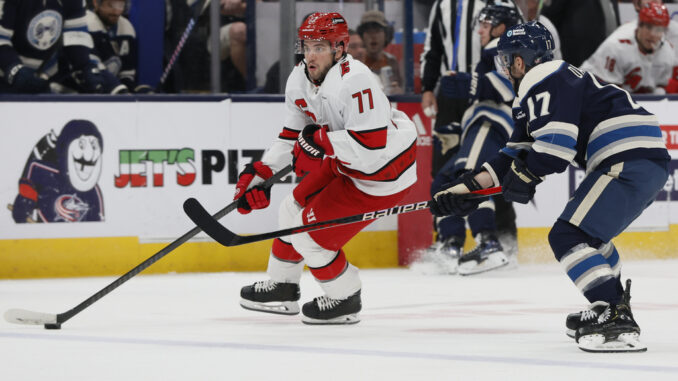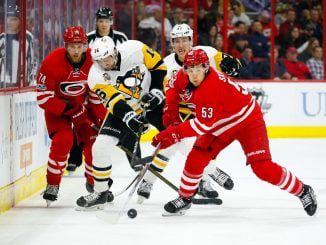
RALEIGH — The Hurricanes will look to end their first round series when the Islanders visit PNC Arena on Tuesday night for Game 5. Carolina won the series’ first three games but lost 3-2 in double overtime in Game 4 on Long Island on Saturday afternoon.
1. The Rangers advanced to the second round of the playoffs after completing their sweep of the Capitals on Sunday, and the winner of the Hurricanes-Islanders series will head to the Big Apple for Games 1 and 2 on dates to be determined.
Just don’t ask Carolina coach Rod Brind’Amour about his team’s potential second round foe.
When asked if the Rangers had an advantage because they had already advanced to Round 2, Brind’Amour quickly cut off the question.
“You keep talking about the next round — that’s so far away from my mind,” he said. “So that’s a question for them. Good on them. They can have that question, we’re not at that point yet.”
2. Defenseman Tony DeAngelo has had to step into the lineup due to the injury to Brett Pesce and has played well alongside Brady Skjei.
“I don’t think it’s hard at all to jump back in,” he said Monday. “On the body it’s a little tough, but on the mind, the hockey mind, it’s not hard at all. … I felt real comfortable, real confident.
“The circumstances are no good — obviously you never want, especially when it’s my best friends, (anyone) to go down. He’s irreplaceable for this team, this franchise. So I’m just trying to come in and do the best job I can to fill that void and try to push us through.”
Brind’Amour has been encouraged by DeAngelo’s play.
“That’s very hard, and it’s impressive that he was able to adjust as well as he has,” the coach said of DeAngelo jumping into the series.
DeAngelo said double overtime in Game 4, rather than sapping his energy, could provide a boost to his conditioning.
“Going forward,” he said, “it actually helps me. … Would’ve liked to get that one done in the second overtime there, but we’ll try to get it done again (Tuesday).”
DeAngelo has been held without a point in two games and admitted he wants to contribute more offensively, but he did have eight shots on goal — including five in Game 4 — in the two games on Long Island.
“I think just jumping back, haven’t played in a while,” he said. “You want to make a simple play, just get your feet involved, get your mind involved. I think there’s another level to get to. … There’s a game-breaking level I want to get to.”
3. One difference for DeAngelo compared to what he’s used to when playing is a lack of power play time. With Brent Burns on the top unit and Skjei quarterbacking PP2, a dynamic part of DeAngelo’s skill set isn’t being utilized.
“For an offensive guy, like you’re making them plays, confidence starts to grow,” DeAngelo said of how success on the power play can provide a boost at even strength. “But I’m confident enough in my 5-on-5 offense.
“I need more of it, need to generate more on my 5-on-5 game. But the power play’s going so well. I totally understand what’s going on. If there’s a time where it’s not and I come in and help, that’s great too, But 2 for 4 last game, that’s good for us.”
4. The Athletic’s Pierre LeBrun had an interesting article on how the NHL handles communication between teams and the officials during playoff series.
They are the buffers between teams and referees at playoff time.
In my latest for @TheAthletic, a look at
NHL series supervisors and how coaches and GMs view their dealings with them in the playoffs. ⤵️ https://t.co/GJ092Yz6hT— Pierre LeBrun (@PierreVLeBrun) April 29, 2024
In the article, LeBrun reports that Carolina is one of the few teams that doesn’t have its coach sit in on meetings with the series’ officiating supervisor (Dan O’Halloran in the current series with the Islanders), with GM Don Waddell handling those discussions.
“He handles it,” Brind’Amour said of Waddell when I asked about the meetings. “We’ve done that in the past, and it really had no benefit. So it’s just something I don’t have to deal with.”
Brind’Amour seemed pretty clear that he doesn’t think the meetings make much of a difference in how the series is officiated.
“I don’t really know what it does,” he said. “So that’s not something of our concern, really.”
5. The finalists for the Calder Trophy were announced, and Hurricanes goaltender Pyotr Kochetkov did not finish among the top three in voting.
Chicago forward Connor Bedard and two defensemen, Minnesota’s Brock Faber and New Jersey’s Luke Hughes, were named finalists for the award honoring the NHL’s top rookie on Monday.
Kochetkov had some factors working against him. While he is still classified as a rookie for the 2023-24 season, this is his third year playing in the league. Also, he hasn’t played yet in this postseason, but he played in playoff games each of the last two years. That familiarity probably turns off some voters.
The Calder hasn’t been awarded to a goalie since 2009 when Columbus’ Steve Mason won the award. Edmonton’s Stuart Skinner finished second to Kraken center Matty Beniers last year.
It was going to take a Herculean effort for Kochetkov to win this year — the award was earmarked for Bedard the moment he was drafted by the Blackhawks, and only his brief injury seemed to bolster Faber’s long-shot campaign.
Kochetkov, however, is deserving of consideration.
He finished with a 23-13-4 record, carrying the load in the Carolina net when Frederik Andersen was on the injured list and Antti Raanta was struggling. His .911 save percentage passes the baseline statistical eye test, and his four shutouts in 40 starts give him eight already in his brief career.
Those numbers are on par with Jeremy Swayman’s rookie year with Boston when he was 23-14-3 with a .914 save percentage and three shutouts. Swayman finished fifth in voting.
Bedard, as I said, was a no-brainer, and Faber certainly deserves to be on the podium among rookies. The question is whether Hughes deserves the recognition over Kochetkov.
He did play more than 21 minutes a night as a 20-year-old, scoring nine goals with 47 points while not missing a game. The loss of Dougie Hamilton to injury definitely raised his minutes and responsibilities, but the Devils were arguably the NHL’s biggest disappointment this season, missing the playoffs.
He probably gets a bloodline boost: Brother and teammate Jack is an emerging superstar, and Vancouver’s Quinn was runner-up for the Calder as a rookie in 2020 and could win the Norris Trophy this year. Also, neqarly 50 points as a rookie defenseman is certainly a standout first season.
I’ll preface the argument for Kochetkov with a statement: plus/minus is dumb. That said, finalists Bedard (-44) and Hughes (-25) didn’t exactly have great forward-facing defensive seasons.
The only times after 2011 a player received Calder votes with a minus 25 or worse were in 2002 when Lucas Raymond (-32) finished fourth in voting and Dawson Mercer (-25) tied for 11th.
Before that, Cam Fowler (-25) finished eighth in 2011 and Tuomo Ruutu (-31) was sixth in 2004.
Rick Nash was the last finalist to finish worse than minus 25 (3rd, -27), and Jay Bouwmeester finished seventh that year despite a minus 29.
Again, plus/minus is dumb, but it’s not totally irrelevant when the numbers skew that much.
All that said, Mario Lemieux won the Calder in 1985 and was minus 33. He turned out OK.
I’m not immune to making a similar vote: In 2011, Swayman was not in my top five, though I did have him as the goalie on my ballot for the All-Rookie Team. My ballot was: 1. Moritz Seider, Detroit; 2. Tanner Jeannot, Nashville; 3. Trevor Zegras, Anaheim; 4. Lucas Raymond, Detroit; 5. Michael Bunting, Toronto.
Yes, the Lucas Raymond who finished minus 33.



